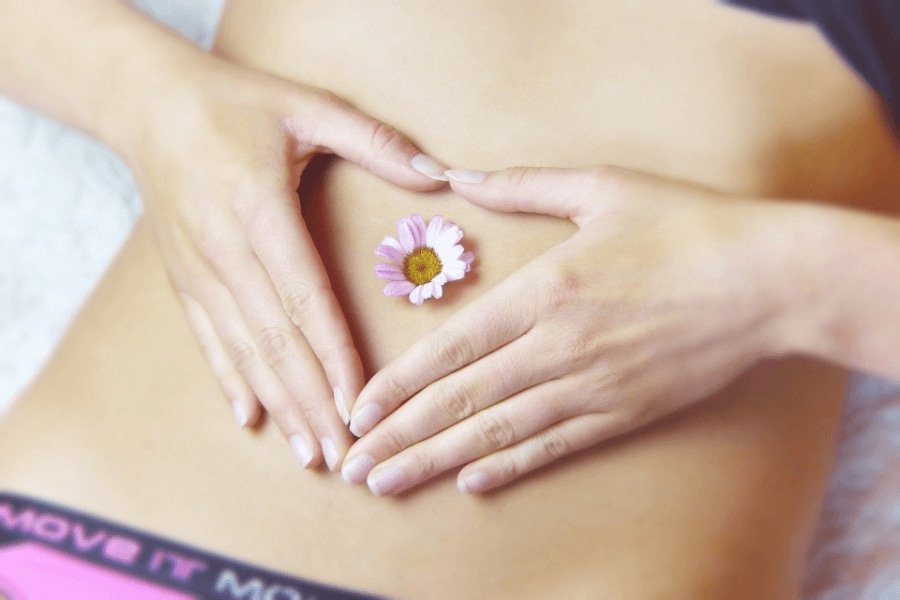OK, I know we don’t like talking about poop, but it is so important that we know about it and it does actually affect our hormones in a massive way (as does all gut health). When I am massaging women’s abdomens, I can feel when she is constipated and when I teach women to massage themselves, even via Zoom, I can see their faces when they feel it themselves, it really shows how much we don’t know about this standard every day process.
Being able to go to the toilet regularly, helps us detox after the liver has done all it’s work to package up all the waste products, and if we don’t poop it out, we start re-absorbing these waste products back into our system.
One typical example is oestrogen dominance. We should use oestrogen once and then excrete it, but if we aren’t pooping regularly, we just reabsorb it into the body and get symptoms of excess oestrogen such as heavy periods, excess weight around the hips, buttocks and thighs, moodiness, PMS, sore breasts, cystic breasts, bloating, painful periods, darker periods and eventually tendency towards endometriosis, cysts and fibroids.
I don’t know about you, but those are things that I don’t think sound like a bucket of fun.
You may also find that you have issues with going to the toilet before your period, and there are a few reasons for this.

Firstly, your womb position and pelvic structure could be less than optimal, and when these tissues are more swollen with lymphatic fluid and the womb is at its most full, there is less space, so it can cause temporary obstruction. (And in some women, this then results in the colon then doing overtime to remove this and the other problem occurs within a few days).
Secondly, during the second half of your cycle, your progesterone levels are rising and progesterone is a muscle relaxant and this also relaxes the muscles of your digestive system, so this might tip you into constipation during this phase of your cycle too.
What Is Normal Poop?
If you go to your doctor, they won’t consider you to have constipation if you haven’t been for a week and you have a hard mass that is very difficult to pass, which can lead to quite excruciating abdominal pain, if left untreated.
However, as a nutritional therapist, I consider going less than once a day an issue and ideally, you should be going 3-5 times a day, usually within 40 minutes of eating because our body is super clever and it uses the waves of motion created in the stomach, called peristalsis, to create contracting waves throughout the whole system, right down to needing to go to the toilet. (Isn’t that amazing?)
Your stool should also be a smooth formed mass several inches long. If it is cracked, dark, hard and dry or starting to come out in smaller pellets, then this is a sign of tendency towards constipation. Anything loose is a sign towards diarrhoea.

What Can You Do To Help Your Digestion?
1. Make sure you are eating lots of veggies to get your fibre up, including the skin where possible.
Fibre acts as a good cleaner for the system to get bulk moved through and excreted within a decent timeframe. Getting in a good variety of vegetables and some fruit everyday is essential to get your gut moving. If you don’t eat vegetables regularly at the moment, up your amount gradually each day.
2. Get a Fertility Or Womb/Abdominal Massage
Whether you go to a therapist or learn from me online, you will find that regular proper massage will help to retire the movement in your gut. All my clients are surprised at the bowel movements afterwards.
3. Get Moving
Start getting more movement into your abdomen and pelvis by moving more. Great activities for getting the movement back are walking, swimming, yoga and pilates. Even better is going for a walk after eating, even if only for a few minutes to help get your digestive system moving.
4. Stay Hydrated
You need enough water in your system both from drinking it and from consuming high water content food to lubricate your system to allow stools to pass. No lubrication makes passing stool much more difficult.
5. Chew Your Food Properly
This is essential for your digestion at all levels. Very few people keep their food in their mouth properly to let the enzymes in their saliva to get started on the food making it easier for your stomach and digestive system. Your stomach doesn’t have teeth so all food should be reduced to liquid or mush before you eat it so that your gut as the chance to digest everything properly and for your colon to be able to move stools through efficiently.




